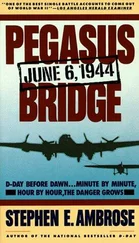Stephen Ambrose - Band of Brothers
Здесь есть возможность читать онлайн «Stephen Ambrose - Band of Brothers» весь текст электронной книги совершенно бесплатно (целиком полную версию без сокращений). В некоторых случаях можно слушать аудио, скачать через торрент в формате fb2 и присутствует краткое содержание. Жанр: История, на английском языке. Описание произведения, (предисловие) а так же отзывы посетителей доступны на портале библиотеки ЛибКат.
- Название:Band of Brothers
- Автор:
- Жанр:
- Год:неизвестен
- ISBN:нет данных
- Рейтинг книги:4 / 5. Голосов: 1
-
Избранное:Добавить в избранное
- Отзывы:
-
Ваша оценка:
- 80
- 1
- 2
- 3
- 4
- 5
Band of Brothers: краткое содержание, описание и аннотация
Предлагаем к чтению аннотацию, описание, краткое содержание или предисловие (зависит от того, что написал сам автор книги «Band of Brothers»). Если вы не нашли необходимую информацию о книге — напишите в комментариях, мы постараемся отыскать её.
Band of Brothers — читать онлайн бесплатно полную книгу (весь текст) целиком
Ниже представлен текст книги, разбитый по страницам. Система сохранения места последней прочитанной страницы, позволяет с удобством читать онлайн бесплатно книгу «Band of Brothers», без необходимости каждый раз заново искать на чём Вы остановились. Поставьте закладку, и сможете в любой момент перейти на страницу, на которой закончили чтение.
Интервал:
Закладка:
The company stayed in Buchloe for two nights. Thus it was present in the morning when the people of Landsberg turned out, carrying rakes, brooms, shovels, and marched off to the camp. General Taylor, it turned out, had been so incensed by the sight that he had declared martial law and ordered everyone from fourteen to eighty years of age to be rounded up and sent to the camp, to bury the bodies and clean up the place. That evening the crew came back down the road from the camp. Some were still vomiting.
"The memory of starved, dazed men," Winters wrote, "who dropped their eyes and heads when we looked at them through the chain-link fence, in the same manner that a beaten, mistreated dog would cringe, leaves feelings that cannot be described and will never be forgotten. The impact of seeing those people behind that fence left me saying, only to myself, 'Now I know why I am here!' "
17 DRINKING HITLER'S CHAMPAGNE
*
BERCHTESGADEN
May 1-8,1945
On the first two days of May, the company drove south from Munich, moving slowly through streams of German soldiers walking in the opposite direction. Often there were more German soldiers with weapons going north than there were Americans going south. "We looked at each other with great curiosity," Winters remembered. "I am sure both armies shared one thought—just let me alone. All I want is to get this over with and go home."
On May 3, Colonel Sink got orders to have the 506th ready to move out at 0930 the following day, objective Berchtesgaden.
Berchtesgaden was a magnet for the troops of all the armies in southern Germany, Austria, and northern Italy. South of Salzburg, the Bavarian mountain town of Berchtesgaden was Valhalla for the Nazi gods, lords, and masters. Hitler had a home there and a mountain-top stone retreat called the Aldershorst (Eagle's Nest) 8,000 feet high. Thanks to a remarkable job of road building, cars could get to a parking place within a few hundred feet of the Aldershorst. There a shaft ran into the center of the mountain to an elevator which lifted into the Aldershorst. The walls of the elevator were gold leaf.
It was to Berchtesgaden that the leaders of Europe had come in the late 1930s to be humiliated by Hitler. Daladier of France, Mussolini of Italy, Schuschnigg of Austria, Chamberlain of Britain, and others. They had feared Hitler, as had the whole world. Now that Hitler was dead, the fear was removed, but that only highlighted the fascination with Hitler and his favorite retreat, which seemed to hold one of the keys to his character.
It was to Berchtesgaden that the highest-ranking Nazi leadership had flocked, to be near their Führer. Himmler, Goering, Goebbels, Martin Bormann had houses in the area. There was a fabulous apartment complex for the SS.
It was to the Berchtesgaden area that much of the loot collected by the Nazis from all over Europe had come. The place was stuffed with money, in gold and in currency from a dozen countries, with art treasures (Goering's collection alone contained five Rembrandts, a Van Gogh, a Renoir, and much more). It was bursting with booze, jewelry, fabulous cars.
So Berchtesgaden was really two magnets: the symbolic home of Hitler's mad lust for power, and the best looting possibilities in Europe. Everybody wanted to get there—French advancing side by side with the 101st, British coming up from Italy, German leaders who wanted to get their possessions, and every American in Europe.
Easy Company got there first.
On May 4, the 101st moved out by convoy down the autobahn between Munich and Salzburg, with 2nd Battalion in the lead. The Americans passed Rosenheim and the Chiem See. At Siegsdorf they turned right on the direct highway to Berchtesgaden. About 14 kilometers down the road, they ran into the tail of the French 2nd Armored Division, the first division to enter Paris, with its famous commander Gen. Jacques Philippe Leclerc.
The 2nd Armored supposedly had been on the right flank of the 101st for the past week, but the Americans had not been able to keep in touch with it. The French were there one minute, gone the next. So far as the Americans could make out, they were looting their way through Germany. Whenever they got a truck load or two of loot, they'd send it back home to France. Now they were lusting to get into Berchtesgaden, only an hour's drive or so up into the mountains to the south. But the French were stopped by a blown bridge over a deep ravine. They did not have bridging equipment, and some SS fanatics were holding out on the south side of the ravine, using automatic weapons and mortars.
Easy Company and the remainder of 2nd Battalion began mixing in with the French, everyone standing around watching a long-range, useless exchange of fire while waiting for the 101st engineers to come forward. Winters asked Sink if he wanted to send a platoon to outflank the German roadblock. "No," Sink replied, "I don't want anybody to get hurt."
That was sensible. There was no point to taking casualties at this stage of the war. But there was Berchtesgaden, just on the other side of the roadblock, almost in hand. Sink changed his mind. "Take the 2nd Battalion back to the autobahn," he told Winters, "and see if you can outflank this roadblock and get to Berchtesgaden." If he succeeded, Sink wanted him to reserve the famous Berchtesgaden Hof for regimental HQ.
Winters led the battalion on a backtrack to the autobahn, then east to Bad Reichenhall, where another blown bridge stopped the Americans for the night. The following morning, May 5, with Easy Company leading the way, the 2nd Battalion drove unopposed to Berchtesgaden and took the town without having to fire a shot.
It was like a fairy-tale land. The snow-capped mountains, the dark green woods, the tinkling icy creeks, the gingerbread houses, the quaint and colorful dress of the natives, provided a delight for the eye. The food, liquor, accommodations, and large number of Luftwaffe and Wehrmacht service women, plus camp followers of various types, provided a delight for the body.
Accommodations were the first order of business. Winters and Lieutenant Welsh went to the Berchtesgaden Hof. As they walked in the front door of the hotel, they could see the backs of the service personnel disappear around the corner. They went into the main dining room, where they saw a waiter putting together a large set of silverware in a four-foot-long velvet-lined case.
There was no need for orders. Winters and Welsh simply walked toward the man, who took off. The Americans split the silverware between them. Forty-five years later, both men were still using the Berchtesgaden Hof's silverware in their homes.
After getting what he most wanted out of the place, Winters then put a double guard on the hotel "to stop further looting," as he put it—with a straight face—in one of our interviews. But, he berated himself, "What a fool I was not to open the place to the 2nd Battalion," because when regimental and then divisional HQ arrived, they took everything movable.
Winters picked one of the homes of Nazi officials, perched on the hillside climbing the valley out of Berchtesgaden, for his battalion HQ. He told Lieutenant Cowing, his S-4, to go to the place and tell the people they had fifteen minutes to get out. Cowing was a replacement officer who had joined up in mid-February, back in Haguenau. He had not been hardened by battle. He returned a few minutes later to tell Winters, "The people said no, they would not move out."
"Follow me," Winters declared. He went to the front door, knocked, and when a woman answered, he announced, "We are moving in. Now!" And he and his staff did just that, as the Germans disappeared somewhere.
"Did I feel guilty about this?" Winters asked himself in the interview. "Did my conscience bother me about taking over this beautiful home? No! We had been living in foxholes in Normandy, we had been in the mud at Holland, the snow in Bastogne. Just a few days earlier, we'd seen a concentration camp. These people were the reason for all this suffering. I had no sympathy for their problem, nor did I feel that I owed them an explanation."
Читать дальшеИнтервал:
Закладка:
Похожие книги на «Band of Brothers»
Представляем Вашему вниманию похожие книги на «Band of Brothers» списком для выбора. Мы отобрали схожую по названию и смыслу литературу в надежде предоставить читателям больше вариантов отыскать новые, интересные, ещё непрочитанные произведения.
Обсуждение, отзывы о книге «Band of Brothers» и просто собственные мнения читателей. Оставьте ваши комментарии, напишите, что Вы думаете о произведении, его смысле или главных героях. Укажите что конкретно понравилось, а что нет, и почему Вы так считаете.



![Stephen Ambrose - Citizen Soldiers [Condensed]](/books/346737/stephen-ambrose-citizen-soldiers-condensed-thumb.webp)
![Stephan Orth - Behind Putin's Curtain - Friendships and Misadventures Inside Russia [aka Couchsurfing in Russia]](/books/415210/stephan-orth-behind-putin-s-curtain-friendships-a-thumb.webp)





